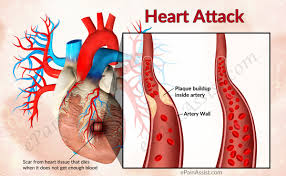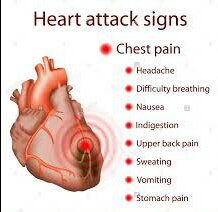Myocardial infarction is also known as “heart attack”.Blockage of blood flow to the heart can lead to myocardial infarction.The blockage can be either due to throbmus or embolism in coronary arteries or due to build up of fat and cholesterol.

Symptoms:
While the classic symptoms of a heart attack are chest pain and shortness of breath, the symptoms can be quite varied. The most common symptoms of a heart attack include:
- pressure or tightness in the chest
- pain in the chest, back, jaw, and other areas of the upper body that lasts more than a few minutes or that goes away and comes back
- shortness of breath
- sweating
- nausea
- vomiting
- anxiety
- a cough
- dizziness
- a fast heart rate

It’s important to note that not all people who have heart attacks experience the same symptoms or the same severity of symptoms. Chest pain is the most commonly reported symptom among both women and men. However, women are more likely than men to have:
- shortness of breath
- jaw pain
- upper back pain
- lightheadedness
- nausea
- vomiting
In fact, some women who have had a heart attack report that their symptoms felt like the symptoms of the flu.
Risk factors:
Heart attack risk factors include:
- Age. Men age 45 or older and women age 55 or older are more likely to have a heart attack than are younger men and women.
- Tobacco. This includes smoking and long-term exposure to secondhand smoke.
- High blood pressure. Over time, high blood pressure can damage arteries that feed your heart. High blood pressure that occurs with other conditions, such as obesity, high cholesterol or diabetes, increases your risk even more.
- High blood cholesterol or triglyceride levels. A high level of low-density lipoprotein (LDL) cholesterol (the “bad” cholesterol) is most likely to narrow arteries. A high level of triglycerides, a type of blood fat related to your diet, also ups your risk of heart attack. However, a high level of high-density lipoprotein (HDL) cholesterol (the “good” cholesterol) lowers your risk of heart attack.
- Obesity. Obesity is associated with high blood cholesterol levels, high triglyceride levels, high blood pressure and diabetes. Losing just 10 percent of your body weight can lower this risk, however.
- Diabetes. Not producing enough of a hormone secreted by your pancreas (insulin) or not responding to insulin properly causes your body’s blood sugar levels to rise, increasing your risk of heart attack.
- Metabolic syndrome. This occurs when you have obesity, high blood pressure and high blood sugar. Having metabolic syndrome makes you twice as likely to develop heart disease than if you don’t have it.
- Family history of heart attack. If your siblings, parents or grandparents have had early heart attacks (by age 55 for male relatives and by age 65 for female relatives), you might be at increased risk.
- Lack of physical activity. Being inactive contributes to high blood cholesterol levels and obesity. People who exercise regularly have better cardiovascular fitness, including lower high blood pressure.
- Stress. You might respond to stress in ways that can increase your risk of a heart attack.
- Illicit drug use. Using stimulant drugs, such as cocaine or amphetamines, can trigger a spasm of your coronary arteries that can cause a heart attack.
- A history of preeclampsia. This condition causes high blood pressure during pregnancy and increases the lifetime risk of heart disease.
- An autoimmune condition. Having a condition such as rheumatoid arthritis or lupus can increase your risk of heart attack.







1 Comment
How to avoid heart attack? - NAMAT blog
(October 21, 2018 - 12:40 pm)[…] Myocardial infarction;symptoms and risk factors […]